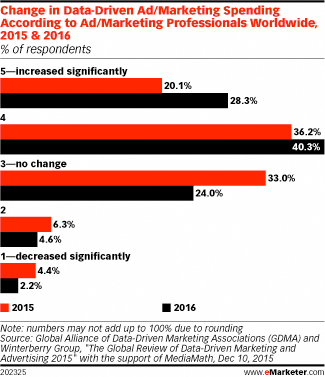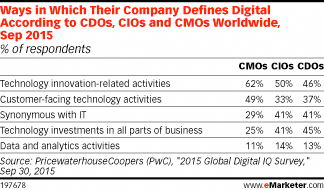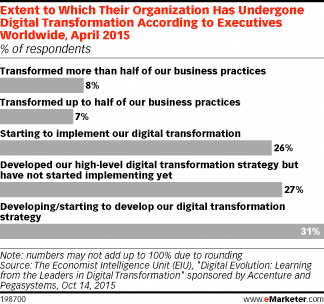How Marketers Are Dealing with the Growth of Tech
March 19, 2016
![]() CEOs today are anxious to harness the power of digital platforms and the data they generate to stay competitive and drive future growth. As a result, marketers that have embraced a data- and tech-driven approach are being tasked to spearhead digital initiatives that cut across the organization, helping raise the awareness and underscore the strategic importance of marketing technology in the process, as explored in a new eMarketer report “Marketing Technology: The Six Developments That Matter the Most in 2016.”
CEOs today are anxious to harness the power of digital platforms and the data they generate to stay competitive and drive future growth. As a result, marketers that have embraced a data- and tech-driven approach are being tasked to spearhead digital initiatives that cut across the organization, helping raise the awareness and underscore the strategic importance of marketing technology in the process, as explored in a new eMarketer report “Marketing Technology: The Six Developments That Matter the Most in 2016.”
 September 2015 data from consultancy PricewaterhouseCoopers (PwC) underscored the top benefit that C-level executives worldwide see by investing in a more digital enterprise: revenue growth. While it’s true that creating a better customer experience is also an important benefit, it’s apparent that business leaders want to ensure those enhancements are ultimately tied back to key business objectives.
September 2015 data from consultancy PricewaterhouseCoopers (PwC) underscored the top benefit that C-level executives worldwide see by investing in a more digital enterprise: revenue growth. While it’s true that creating a better customer experience is also an important benefit, it’s apparent that business leaders want to ensure those enhancements are ultimately tied back to key business objectives.
Though business and technology managers find that CEOs are the most effective at working to integrate and align their organization’s technology department to meet new business demands (like being more digital- and customer-centric, for example), marketing executives are not far behind. July 2015 research from think tank Business Performance Innovation (BPI) Network found that chief sales, marketing or customer experience officers are more effective than even chief technology officers (CTOs) at merging tech and business goals, at least in the view of business/technology managers worldwide who were queried.
 CMOs, chief information officers (CIOs) and the increasingly common CDOs all look at what digital means for their business in slightly different ways, per PwC’s survey. While all three agreed that “technology innovation-related activities” were an important aspect in defining digital for their company, CMOs ranked customer-facing tech activities higher and viewed digital as less synonymous with IT than did CIOs and CDOs.
CMOs, chief information officers (CIOs) and the increasingly common CDOs all look at what digital means for their business in slightly different ways, per PwC’s survey. While all three agreed that “technology innovation-related activities” were an important aspect in defining digital for their company, CMOs ranked customer-facing tech activities higher and viewed digital as less synonymous with IT than did CIOs and CDOs.
Ashu Garg, general partner at early-stage venture capital firm Foundation Capital, says that this may be because “the biggest priorities for digital transformation are marketing-related issues: transforming the customer experience, commerce and marketing communication.” As a result, Garg believes that as the world becomes more digitally inclined, marketing “will play an increasing role in driving the technology agenda.”
 August 2015 data from the Association of National Advertisers (ANA) supports Garg’s thinking. It showed that US marketing organizations—the groups that have to execute these digital initiatives—now have a diverse array of roles to support more digitally adept companies. More than half of marketers polled said they previously had existing roles dealing with social media (76%), marketing operations (65%) and customer experience (56%); nearly half also had staff dedicated to marketing technology.
August 2015 data from the Association of National Advertisers (ANA) supports Garg’s thinking. It showed that US marketing organizations—the groups that have to execute these digital initiatives—now have a diverse array of roles to support more digitally adept companies. More than half of marketers polled said they previously had existing roles dealing with social media (76%), marketing operations (65%) and customer experience (56%); nearly half also had staff dedicated to marketing technology.
Additionally, top functions created in 2015 included content strategy (30%), marketing/digital transformation (21%) and mobile (18%). And the top roles planned for creation in 2016 were data science, customer experience and mobile.
Even so, to be a true change agent across an organization, “CMOs need to forge tighter partnerships with the CIOs and several other functions within the organization,” Kompella said. While marketing can certainly help the business understand customers better, delivering superior customer experiences extends beyond the marketing department, he added. Instead, “you need a strategy for the overall digital transformation for the organization.”
Courtesy of eMarketer





























